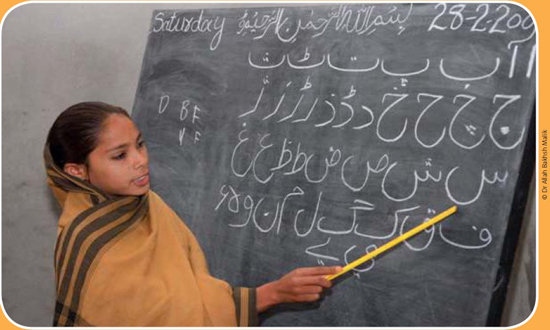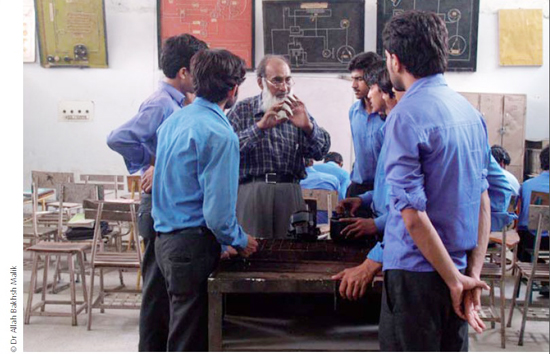巴基斯坦扫盲项目:数百万人受益
2011-12-13 14:07:00 来源: 大众网 我要评论
[提要] 为砖窑里的童工带去改变命运的课程,这是巴基斯坦扫盲项目领导获得孔子教育奖荣誉奖的原因第一。该奖授予巴基斯坦遮邦政府官员阿拉赫·巴克什·马里克,以表彰其在成人教育和技术职业教育中发挥的领导作用。
巴基斯坦
面向童工、妇女和边缘群体的巴基斯坦扫盲项目



巴基斯坦旁遮普邦扫盲与非正规基础教育部门秘书阿拉赫·巴克什·马里克博士因其成人教育和职业技能教育项目获得孔子教育奖荣誉奖
为砖窑里的童工带去改变命运的课程,这是巴基斯坦扫盲项目领导获得孔子教育奖荣誉奖的原因第一。该奖授予巴基斯坦遮邦政府官员阿拉赫·巴克什·马里克,以表彰其在成人教育和技术职业教育中发挥的领导作用。
“2020年使旁遮普邦扫除文盲”包含六个项目,目前已经帮助了120万5-14岁的失学儿童完成初等教育,其中60%为女童;同时帮助190万成人获得基本的读写能力和进一步学习的技能。旁遮普邦有4000万文盲和380万辍学儿童,其中大多数为妇女和女童,大多居于贫民窟和最贫困的农村地区。
该项目于2009年发起,计划于2012年止,目标群体为边缘人群,包括从未上学的儿童及成人文盲,特别是生活在贫民窟和旁遮普邦扫盲水平最低的农村地区的妇女。
马里克博士设计并实施了六个计划,其财政支持来自巴基斯坦政府、联合国教科文组织、日本国际合作机构、英国国际合作部及世界银行都给予了技术支持。
他说,一开始通过宣传活动介绍职业技术课程来消除扫盲的障碍。同时也让家长们和童工们知道,一旦他们的孩子接受扫盲之后,其收入将会有所增加。
萨比哈·喀恩是来自拉哈儿附近的小城穆扎发哈赫,以前是个女佣,而6个月的功能性扫盲和技术培训改变了她的一生。她说:“我学习了读、写、简单的算术以及针线活儿,三个月后我自己买了一台机器开始缝制女士成衣,每天挣500-600块。我还买了缝纫机和刺绣机,开始设计婚纱,两年后,我自己开始做起了生意,雇佣了20个技工。我的孩子们上了公立学校,现在我的家庭过上了宽裕的生活。
11岁的塞亚在非正规基础教育学校获得了第二次受教育的机会。现在她已经完成了初等教育并且将进入正规主流的教育系统。“扫盲给我的生活带来了第二次契机”,她说,“我原本想成为一个医生,但是在我过了入学年龄的时候我想那便成了一个梦想,现在我的梦想又开现实起来了。”
项目的成果还包括:
自2009年以来开展的加强扫盲运动已使1300万人受益;
成立了300个成人扫盲中心和200个减灾砖窑场的非正规基础教育学校,为4000个成人和5500名儿童提供扫盲;
建立社区学习中心,为2400名妇女提供技能型扫盲;
通过旁遮普扫盲和生活项目,向7500人提供扫盲和技能培训;
在非正规教育部门培训1.24万教学法老师;
马里克说:“文盲带来严重的经济和社会后果。扫盲将个体转变成有知识的劳动者,对社会人力资源的形式有着核心作用。同时扫盲也是保护和平的盾牌。”该项目推广到了巴基斯坦其他地区,以及阿富汗、孟加拉国和印度。
www.Literacy.gop.pk
www.punjab.gop.pk
Mary de Sousa
Child labourers, women and the marginalized targeted by Pakistani literacy programme
Dr Allah Bakhsh Malik, Secretary of the Department of Literacy and Non-formal Basic Education, Punjab Province, Pakistan, was awarded the Honorable
Mention of the UNESCO Confucius Prize for Literacy for the Adult Education and Vocational skills programme
Life-changing courses for child workers in the brick kiln industry are among the initiatives that have helped the head of a Pakistani literacy project gain the Honourable Mention of the UNESCO Confucius Prize for Literacy. Government Secretary of the Punjab Literacy and Non-formal Basic Education Department, Dr Allah Bakhsh Malik, was awarded the mention for his leadership role in the Literacy, Adult Education and Vocational Skills programme.
Through six projects the ongoing programme which runs under the banner “Making Punjab literate by 2020” has enabled 1.2 million out-of-school children aged 5-14, 60 per cent of them girls, to complete primary education and given literacy and life skills to a further 1.9 million adults. The Punjab has 40 million illiterate adults and 3.8 million out-of-school children with girls and women in slums and rural areas the most disadvantaged.
Launched in 2009, the programme, which runs until 2012, is directed at marginalized groups including children who have never gone to school and adult illiterates, particularly women, living in urban slum and rural areas of the Punjab where literacy levels are lowest.
Dr Malik devised and implemented the six projects with funding from the Pakistani government and technical assistance from organizations including UNESCO, the Japan International Cooperation Agency (JICA), the Department for International Development, United Kingdom (DFID) and the World Bank.
He said that initial resistance to the literacy programme was overcome with the introduction of vocational skills courses offered alongside and backed by advocacy and awareness campaigns. Parents of child labourers also had to be convinced that their working children would increase their income level later in life as a result of becoming literate.
For 24-year-old former housemaid Sabiha Khan from Muzaffargarh, near Lahore, one six-month functional literacy and skills programme changed her life. She said: “I learnt reading, writing and simple arithmetic calculations along with sewing and stitching. After three months I purchased my own machine and began stitching clothes for ladies and started earning PKR 500-600 per day. I purchased sewing and embroidery machines and started designing bridal costumes. Now after two years, I have my own business, employing 20 skilled workers. My children have started attending public schools and my family is leading a prosperous life.”
Eleven-year-old Saira was given a second chance at learning by joining a Non-Formal Basic Education School. She has now completed the primary level and will join the formal mainstream system. “Literacy has given me a second lease of life,” she said. “I wanted to become a doctor but since I passed the school-going age that was a dream. Now my dream has materialized.”
Achievements across the range of projects include:
the Campaign for Enhancement of Literacy which has reached 13 million people since its inception in 2009
establishing 300 Adult Literacy Centres and 200 Non-Formal Basic Education schools at brick kiln sites providing literacy to more than 4000 adults and 5,500 children
establishing Community Learning Centers to provide literacy to skills training to 2400 women
imparting literacy and skills training to 7500 people through the Punjab Literacy and Livelihood Programme
training 12,400 teachers in teaching methodology of Non-Formal Education Sector
Dr Malik said: “The economic and social consequences of illiteracy are huge. Literacy transforms individuals into knowledge workers and is central to the formation of human social capital. Literacy is also a shield for peace.”
The programme has been replicated in other areas of Pakistan as well as in Afghanistan, Bangladesh and India.
www.Literacy.gop.pk
www.Punjab.gop.pk
Mary de Sousa

> 进入微博< 热点图片
大众网版权与免责声明
1、大众网所有内容的版权均属于作者或页面内声明的版权人。未经大众网的书面许可,任何其他个人或组织均不得以任何形式将大众网的各项资源转载、复制、编辑或发布使用于其他任何场合;不得把其中任何形式的资讯散发给其他方,不可把这些信息在其他的服务器或文档中作镜像复制或保存;不得修改或再使用大众网的任何资源。若有意转载本站信息资料,必需取得大众网书面授权。
2、已经本网授权使用作品的,应在授权范围内使用,并注明“来源:大众网”。违反上述声明者,本网将追究其相关法律责任。
3、凡本网注明“来源:XXX(非大众网)”的作品,均转载自其它媒体,转载目的在于传递更多信息,并不代表本网赞同其观点和对其真实性负责。本网转载其他媒体之稿件,意在为公众提供免费服务。如稿件版权单位或个人不想在本网发布,可与本网联系,本网视情况可立即将其撤除。
4、如因作品内容、版权和其它问题需要同本网联系的,请30日内进行。




